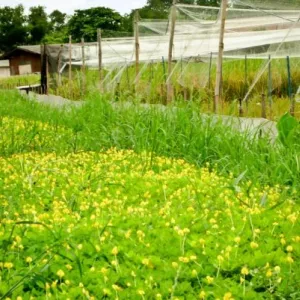Diversified rice farms with vegetable plots and flower strips are associated with fewer pesticide applications in the Philippines
The high use of chemical pesticides at large scales and the co-dependence of technologies, such as hybrid rice varieties and direct-seeded rice, are associated with higher pesticide use than traditional varieties and establishment methods have resulted in a technological lock-in for pesticide use, whereby the increasing use of pesticides reduces farmers’ willingness to adopt more environmentally friendly pest and weed

Diversified rice farms with vegetable plots and flower strips are associated with fewer pesticide applications in the Philippines
The high use of chemical pesticides at large scales and the co-dependence of technologies, such as hybrid rice varieties and direct-seeded rice, are associated with higher pesticide use than traditional varieties and establishment methods have resulted in a technological lock-in for pesticide use, whereby the increasing use of pesticides reduces farmers’ willingness to adopt more environmentally friendly pest and weed management options.
In well-managed rice fields, a diversity of generalist and specialist natural enemies, a high degree of intraguild predation, and a range of interconnected negative feedback loops regulate arthropod densities such that rice herbivores normally occur in relatively low numbers and decline in abundance as the crop matures.
Rice is the main staple food for over half of the world’s human population. Much of rice production occurs in the tropical coastal lowlands of South and Southeast Asia. Rapid population growth (i.e., the global population is estimated to exceed 9 billion by 2050), particularly in tropical Asia, has increased pressures on Asian farmers to intensify rice production.
In response, rice intensification practices including the use of high-yielding rice varieties, increased mechanization, and an increasing use of agrochemical inputs, have been promoted by national and international agricultural development institutes, often in partnership with the private sector.
Pesticide use, in particular, has increased dramatically among Asian farmers in recent decades: this is partly due to massive increases in global chemical production since the beginning of the millennium and intense marketing by agrochemical companies.
High use of chemical pesticides at large scales and the co-dependence of certain technologies (i.e., hybrid rice varieties and direct-seeded rice are associated with higher pesticide use than traditional varieties and establishment methods has resulted in a technological lock-in with respect to pesticide use, whereby the increasing use of pesticides reduces farmers’ willingness to adopt more environmentally friendly pest and weed management options.
In well-managed rice fields, a diversity of generalist and specialist natural enemies, a high degree of intraguild predation, and a range of interconnected negative feedback loops regulate arthropod densities such that rice herbivores normally occur in relatively low numbers and decline in abundance as the crop matures.
However, natural enemies are often highly vulnerable to insecticides and other pesticides. Indeed, outbreaks of key rice pests such as planthoppers, stemborers, and leaffolders have been linked to excessive pesticide use throughout Asia.
These outbreaks were associated with a declining abundance of natural enemies, particularly during early rice crop stages. In response to insecticide-related perturbations of rice arthropod communities and the consequent widespread and large-scale outbreaks of rice pests, researchers proposed that farmers should avoid resurgence-causing insecticides and reduce overall insecticide.

